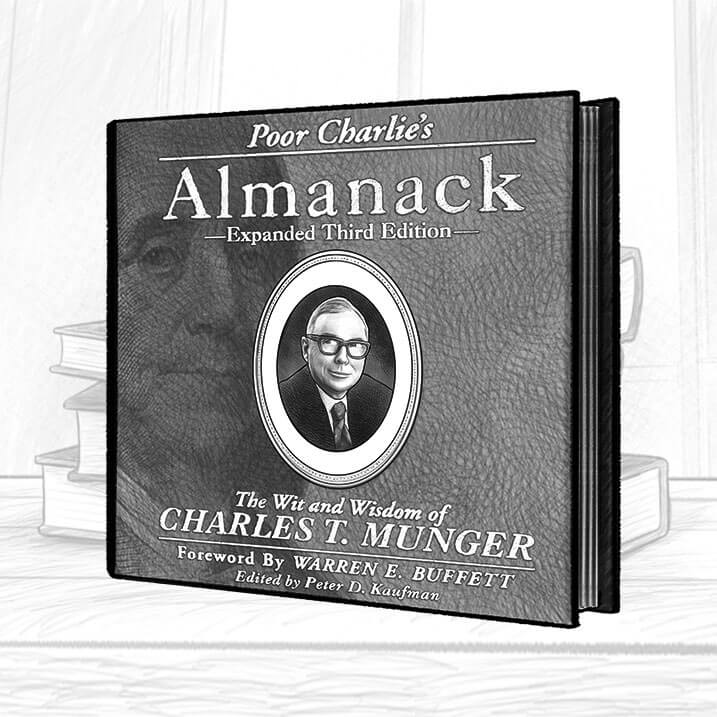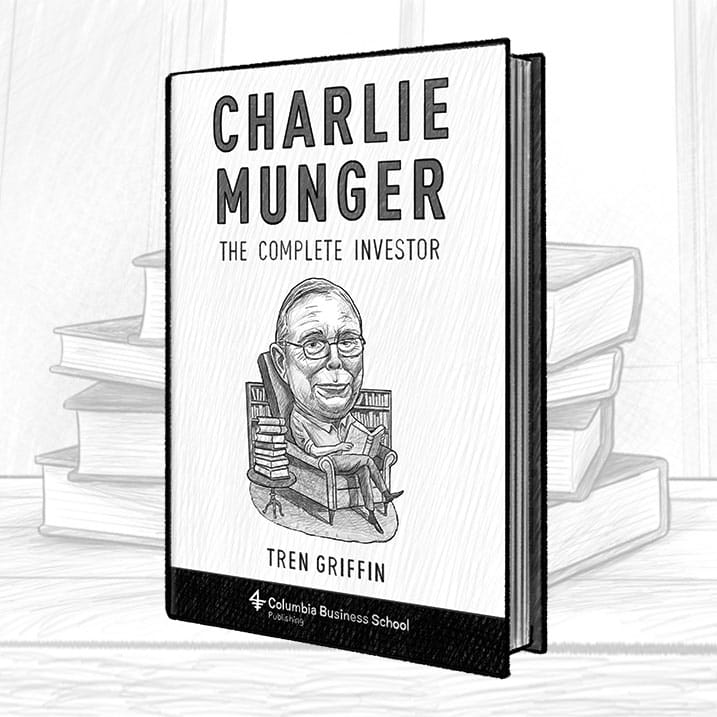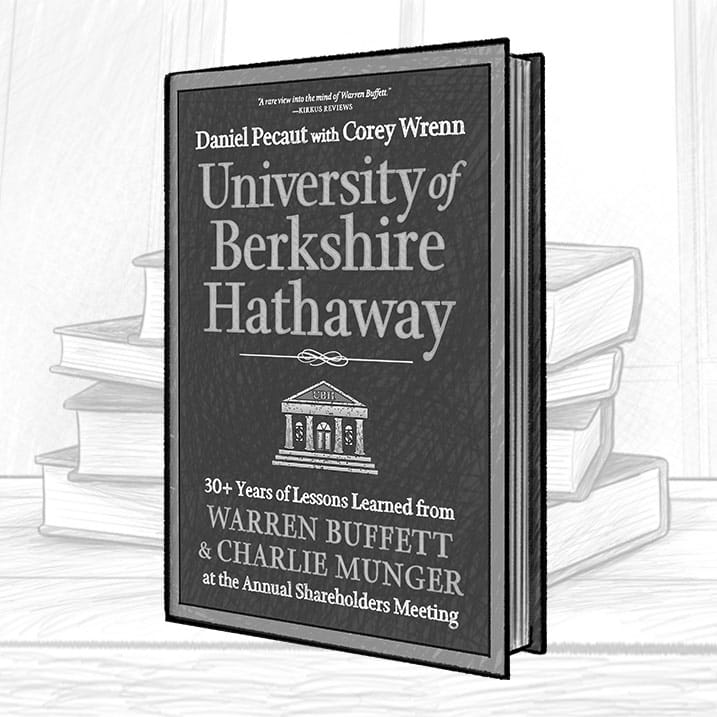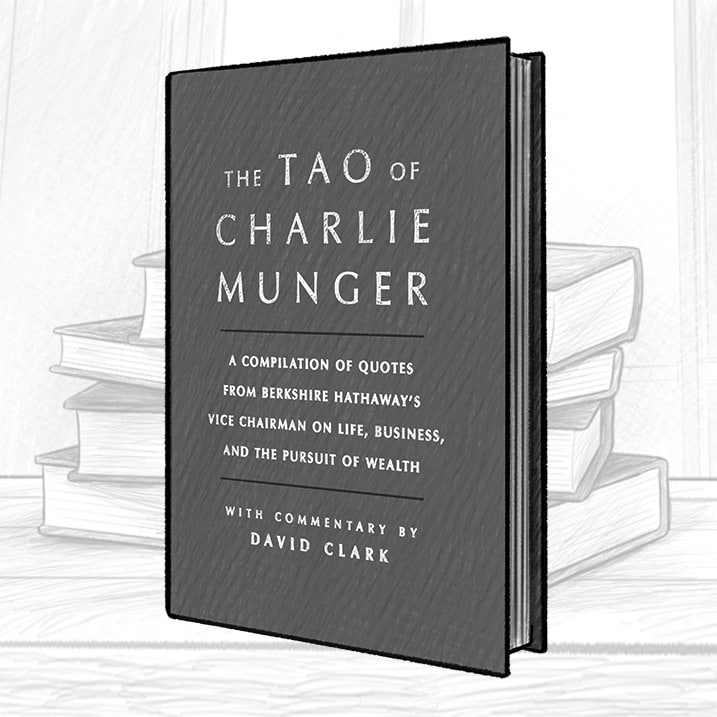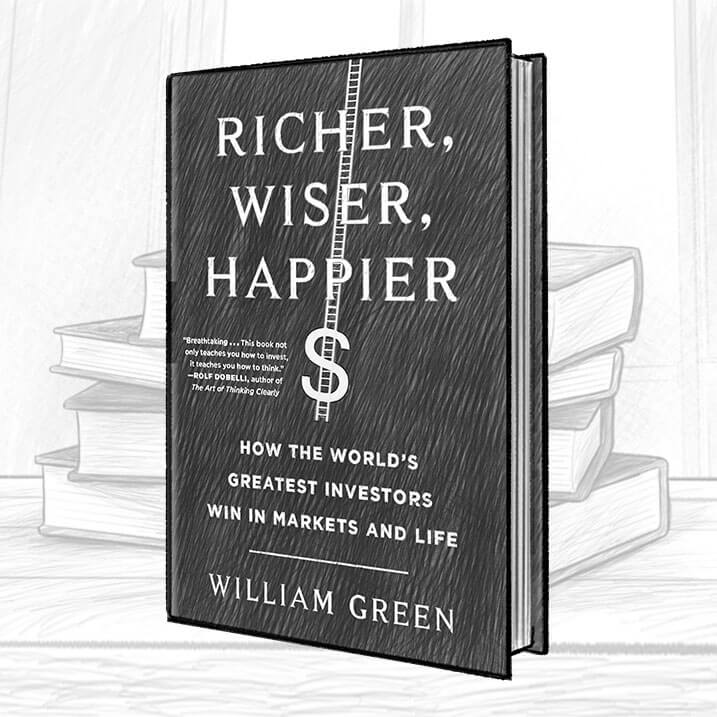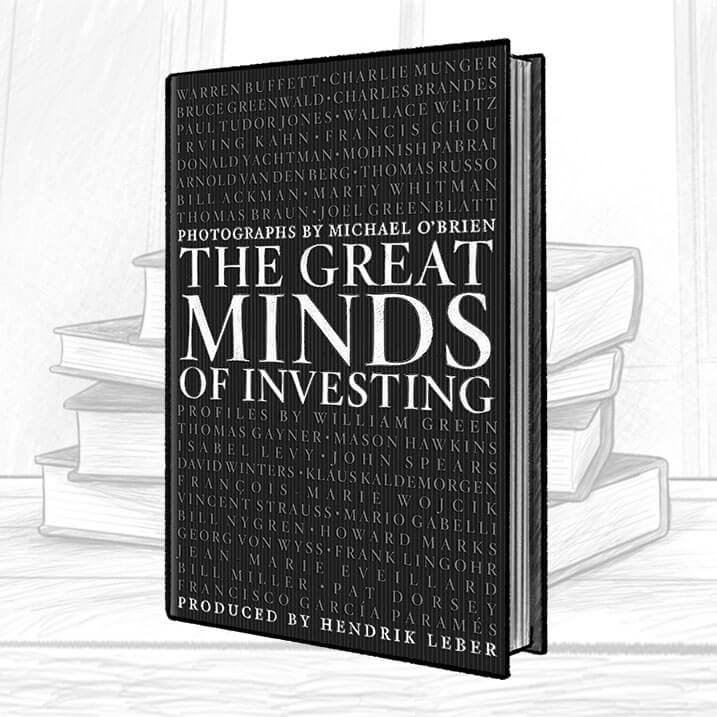Get TIP’s Guide to Understanding
Intrinsic Value for FREE!
Charlie Munger: Life, Lessons, and Worldly Wisdom
By Clay Finck • Updated: • 12 min read
Charlie Munger is the second-half of Berkshire Hathaway that often goes overlooked. Warren Buffett is well-known for leading Berkshire Hathaway, but he is only one-half the reason Berkshire has become one of the largest companies in the world. Charlie Munger is the other.

As Buffett’s partner and right-hand man, many people dive into learning how Charlie Munger became one of the world’s greatest investors, only to discover the incredible wisdom he has accumulated over the past 80+ years.
Buffett respects Charlie Munger highly, as he noted that Munger has “the best thirty-second mind in the world” and that “he sees the essence of everything before you can even finish the sentence.”
Bill Gates says that Munger is the broadest thinker he has ever encountered, and Mohnish Pabrai regarded Munger as a quantum leap above Warren in terms of intelligence.
CHARLIE MUNGER’S BACKGROUND
To give some background on who Munger is today, Charlie Munger was born in Omaha, Nebraska, and as a teenager, worked at the Buffett & Son grocery store owned by Warren Buffett’s grandfather.
After high school, Munger enrolled at the University of Michigan to study mathematics before dropping out in his second year to serve in the U.S. Army Air Corps, where he was trained as a meteorologist and promoted to second lieutenant.
Munger then managed to get into Harvard Law School without an undergraduate degree, following his father and grandfather’s footsteps of being a lawyer. Upon earning his law degree, he moved to Southern California to join a law firm in the big city.
It wasn’t until Munger met Warren Buffett did he transition to a career in investing. Munger and Buffett first met in 1959 when Munger was 35 years old. Which, I find a fascinating, given that Munger was born in Omaha and worked for Buffett’s grandfather.
Practicing as an attorney was always a means to an end for Charlie Munger, and he put a lot of value on building wealth and achieving financial independence.
Buffett helped Munger realize he could reach the level of autonomy he desired through an investment partnership and managing money for others. Hence, Munger transitioned to a career in managing other people’s money.
Charlie Munger’s investment fund achieved a 19.8% annual return over its 14-year tenure from 1962 through 1975, while the Dow had a return of 5.0%.
Today, Munger is the director and vice-chairman of Berkshire Hathaway and has served the company since 1978. Charlie Munger’s age is 99, yet he still helps Buffett with major capital allocation decisions, including managing Berkshire Hathaway’s $300 billion stock portfolio.
He was previously a chairman at the Daily Journal until March of 2022. He was also the chairman of Wesco Financial Corporation from 1984 through 2011, which is now a wholly-owned subsidiary of Berkshire Hathaway.
MENTAL MODELS
“I’ve long believed that a certain system, which almost any intelligent person can learn, works way better than the systems most people use. What you need is a latticework of mental models in your head. And, with that system, things gradually get to fit together in a way that enhances cognition.” – Charlie Munger
Munger is quite well-known for what he calls “mental models”, which are essentially frameworks we can use to simplify our highly complex world and simplify it to something much more manageable and understandable.
Instead of making a stand-alone assessment of a company’s financial information, Charlie conducts a comprehensive analysis of the internal workings of a business and the ecosystem in which the business operates. The mental models Munger uses are borrowed from various disciplines, including history, psychology, mathematics, engineering, biology, physics, statistics, economics, and many others. From Munger’s point of view, it’s crucial to be multidisciplinary and study various subjects to understand better the highly complex world we live in.
In regards to mental models, Charlie Munger stated:
“You must know the big ideas in the big disciplines and use them routinely – all of them, not just a few. Most people are trained in one model, economics for example, and try to solve problems in one way. You know the old saying: To the man with a hammer, everything looks like a nail. This is a dumb way of handling problems. You need a different checklist and different mental models for different companies…You have to derive it yourself to ingrain it in your head for the rest of your life.”
DON’T FOOL YOURSELF
One of the fundamental mental models that makes Charlie Munger so wise is the idea of not fooling yourself.
Munger says that the ethos of not fooling yourself is one of the best mental models and is powerful because it’s so rare. When it comes to investing, many people are their worst enemy, and let their emotions get the best of them in both up and down markets.
Most people buy enthusiastically in a bull market when everyone’s getting rich and sell during a bear market when the outlook becomes bleak, which is the exact opposite of how you make money with investing.
William Green, the host of TIP Network’s Richer Wiser Happier series, regards Munger as “The Grand Master of Stupidity Reduction.” Green highlights in his book Richer Wiser Happier that Munger strives to consistently reduce his capacity for foolish thinking, idiotic behavior, unoriginal error, and standard stupidities.
While other people are trying to be smart, all he’s trying to do is be non-idiotic, and this is much harder to do than people seem to believe.
This brings us to another idea Munger often preaches: Inversion. When handed a problem, Munger frequently inverts the issue and solves it in reverse.
Using investing as an example, Munger encourages others to think about what a terrible investor would do and avoid these standard stupidities. Poor investors often do things such as:
- Buy into the hype based on FOMO
- Sell when the market crashes and stocks are cheap
- Believe that they can time the market’s tops and bottoms
- Make decisions based on their emotions in the moment
- Incur excessive fees and taxes
- Invest in something they don’t fully understand
When approaching investing or life, Munger emphasizes what not to do first rather than what to do. He’s been known for saying, “All I want to know is where I’m going to die, so I don’t go there.”
Get TIP’s Guide to Understanding
Intrinsic Value for FREE!
CHARLIE MUNGER’S INFLUENCE ON WARREN BUFFETT
“It’s not bringing in the new ideas that’s so hard. It’s getting rid of the old one’s.” – John Maynard Keynes
Warren Buffett might not have become the incredible investor he is known as today if it weren’t for Charlie Munger. Buffett famously transitioned from buying the cheapest businesses he could find, known as “cigar butts” to buying quality businesses. He largely came to make this transition because of Charlie Munger.
Early in his investment career, Buffett was largely influenced by Benjamin Graham, who was adamant about ensuring you don’t overpay for a company and that you have a large margin of safety, which frequently led Buffett to buy inferior, but cheap businesses. It took someone as wise as Charlie Munger to open Buffett’s eyes to the profits to be made by paying a bit more for the highest quality businesses.
Looking back, Buffett would have walked away if he only had to pay slightly more for a quality company like See’s Candy. Still, even with the $25 million purchase price that seemed rich for Buffett at the time, it has produced $2 billion in pre-tax profits since they purchased it in 1972, furthering his belief that it’s worth paying up for quality businesses.
Part of what makes Buffett and Munger so great is their continuous ability to evolve not only as investors but also as individuals.
Munger stated, “If Berkshire has made modest progress, a good deal of it is because Warren and I are very good at destroying our best-loved ideas. Any year that you don’t destroy one of your best-loved ideas is probably a wasted year.”
Buffett’s transition from purchasing poor and cheap businesses to purchasing quality businesses led him to make large bets on Coca-Cola in 1988 and Apple in 2016, both of which proved to be incredibly successful investments. Munger believes that focusing on quality businesses is where the majority of Berkshire Hathaway’s money has been made since Buffett took over in 1965.
CHARLIE MUNGER’S INVESTMENT APPROACH
One of Charlie Munger’s most well-known investing characteristics is not buying and selling very often.
When Munger finds a quality business he likes, he tends to make a huge bet and hold it for a very long time as he believes that a successful investment career is made from only a handful of decisions. He doesn’t take small starter positions or minuscule speculative bets.
Munger recognizes that the stock market is relatively efficient and reasonably priced, but from time to time, the odds are heavily stacked in his favor, and that is when he acts in size and bets big with his investments. A majority of Charlie Munger’s portfolio sits in just three investments – Berkshire Hathaway, Costco, and a portfolio of Chinese stocks selected by Li Lu.
When Munger selects a company, he first ensures that the business is within his circle of competence that he knows well. Once he finds a business within that circle, he wants to invest in a dominant franchise that is easy to understand and can sustain itself during all market environments.
It’s critical that the business also has a solid and enduring moat or competitive advantage and for that competitive advantage to expand and strengthen with each passing year. Charlie Munger is laser-focused on this issue because very few companies can survive over many decades, and he wants to own the ones that do.
Because of Charlie’s exhaustive process in determining a particular company to invest in, his process requires considerable self-discipline and considerable periods of inactivity.
Munger’s overall investment approach is complex; however, it can be broken down into four fundamental principles: preparation, discipline, patience, and decisiveness.
INCENTIVES
“This maxim is a wise guide to a great and simple precaution in life: Never ever think about something else when you should be thinking about the power of incentives.” -Charlie Munger
One of Munger’s most prominent role models, Benjamin Franklin, stated, “If you would persuade, appeal to interest and not to reason.”
Munger is very vocal about the power of incentives. Understanding incentives is fundamental to a successful life, career, and investment approach. Let’s take investing as an example…When you invest in an individual stock, it’s desirable for you that the managers of that business have a significant ownership stake as well because their decisions have a huge impact on the success or failure of that business over time. The management team’s large ownership stake in the company aligns your incentives with theirs.
Another example is incentives within the finance industry. When you’re often told the benefits of an investment or insurance product, the person sharing the great benefits of the hot product is being paid a hefty commission that you ultimately pay. The salesman’s gain is your loss, which leads to poor incentives.
Because of the misaligned incentives, the salesman will highlight the product’s benefits while understating how much the financial product costs and how much in fees you, as the consumer, are ultimately paying. Misaligned incentives lead people to make decisions that are not in their best interest.
Buffett and Munger built Berkshire Hathaway in a way that aligned the interest of shareholders with the managers.
Berkshire’s management team has a substantial portion of their net worth invested in Berkshire Hathaway stock, so they reap what they sow alongside shareholders. According to Poor Charlie’s Almanack, released in 2005, Munger has 90% of his net worth in Berkshire Hathaway.
There’s so much to be gained from studying someone like Charlie Munger. If I had to distill Charlie Munger’s message down to one point, it would be this: If you never stop learning, you will never stop rising.
To achieve what Munger calls “Worldly Wisdom,” we must embrace lifelong learning and take in information from all angles. Continually learning from various sources allows us to better understand the world and appreciate just how complex the world is.
Munger not only learned from all various disciplines, such as psychology and biology, but also studied the great people that came before him, including Benjamin Franklin, John D. Rockefeller, and Andrew Carnegie.
Hopefully Charlie Munger can inspire you to live a life full of continuous learning.
CHARLIE MUNGER QUOTES
As you can likely tell from this piece, Munger has much wisdom and insight we should learn from each and every day. What better way to do that to remember his wisdom and advice in Charlie Munger quotes:
“Knowing what you don’t know is more useful than being brilliant.”
“A lot of people with high IQs are terrible investors because they’ve got terrible temperaments.”
“To get what you want, you have to deserve what you want. The world is not yet a crazy enough place to reward a whole bund of undeserving people.”
“Take a simple idea and take it seriously.”
“The best thing a human being can do is to help another human being know more.”
“You need patience, discipline, and agility to take losses and adversity without going crazy.”
“It’s not supposed to be easy. Anyone who finds it easy is stupid.”
“Like Warren, I had a considerable passion to get rich. No because I wanted Ferraris – I wanted the independence. I desperately wanted it.
“Opportunity comes to the prepared mind.”
“I believe in the discipline of mastering the best that other people have ever figured out. I don’t believe in just sitting down and trying to dream it all up yourself.”
“Simplicity has a way of improving performance by enabling us to better understand what we are doing.”
“It’s waiting that helps you as an investor and a lot of people just can’t stand to wait. If you didn’t get the deferred-gratification gene, you’ve got to work very hard to overcome that.”
“When you borrow a man’s car, always return it with a tank of gas.”
CHARLIE MUNGER BOOKS
If you’d like to keep reading, as Munger would like you to do, check out these Charlie Munger books:
FREQUENTLY ASKED QUESTIONS ABOUT CHARLIE MUNGER
Get TIP’s Guide to Understanding
Intrinsic Value for FREE!
About The Author

Clay Finck • We Study Billionaires Host
Clay Finck graduated from the University of Nebraska-Lincoln with a bachelor’s degree in Actuarial Science and minors in Mathematics, Finance, & Economics.
Before joining TIP, he became an Associate of the Society of Actuaries and developed a deep interest in value investing on the side. Clay is passionate about educating others about financial literacy, personal finance, stock investing, Bitcoin, and personal development. In his free time, he enjoys going to the gym, playing basketball, listening to podcasts, and spending time with friends and family.
Clay Finck • We Study Billionaires Host
Clay Finck graduated from the University of Nebraska-Lincoln with a bachelor’s degree in Actuarial Science and minors in Mathematics, Finance, & Economics.
Before joining TIP, he became an Associate of the Society of Actuaries and developed a deep interest in value investing on the side. Clay is passionate about educating others about financial literacy, personal finance, stock investing, Bitcoin, and personal development. In his free time, he enjoys going to the gym, playing basketball, listening to podcasts, and spending time with friends and family.

